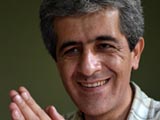“The Stain”: A Short Story by Ahmad Hassanzadeh
by Yaghoub Yadali Translation by Parvaneh Torkamani / November 20, 2015 / 2 Comments

Abadan Petrochemical Complex in Gachsaran, Iran. Photo via Wikimedia Commons
Yaghoub Yadali presents a short story by emerging Iranian writer Ahmad Hassanzadeh.
Eighteen years ago when I went for the first time to Gachsaran, a small town in the south of Iran, I came across a strange scene: On the streets of the city, from the slits on the ground, from between the stones and dirt and narrow openings in the asphalt, came small flames. Some times there were small fires all across a street and people went about their daily business without paying attention. When I asked around, I was told that these were gases and they were poisonous, so they were set on fire so they would not spread into the air. The people of Gachsaran sat on huge reservoirs of gas and oil. Oil, this black gold, was the center of their whole lives.
Recently I read a short story titled “The Stain” written by Ahmad Hassanzadeh, a talented writer of the new generation of Iranian writers. “The Stain” attends to this matter with an artistic and unconventional vision: from the point of view of a child. Hassanzadeh is from Gachsaran and, with his first book published this year, gives a different and strange image of cities like Gachsaran to his audience. The writer has created an interpretable and metaphoric work that can be interpreted by each reader specific to his own feelings — a story that could happen in any oil rich part of the world. Let’s read the story together:
As soon as the child stepped into the yard he saw the oil stain. He told himself: Pitch. He thought that the asphalt from the roof had melted in the heat, and it had drained down the drain. He wiped it with his father’s dirty shoe wax cloth. He opened the door to the yard and looked into the alley. The alley was steep and it arched at the end. You couldn’t see the main street. The alley was quiet. He closed the door and came back to the yard and looked at the scooter that was spread in the middle of the yard. It was getting dark. He stayed in the yard till the night came. He scratched his head and came inside. He had made a decision to fix his scooter. This time, he must go down the slope of the alley faster than other kids.

- “Enemy…terrorism…nuclear bomb…war.” These words are often used by American media to describe Iran. The image the media presents is often hazy, incomplete, and distorted. The political and military aspects of my country are covered mainly in a negative light.
- In Under Eastern Eyes (I have adopted the name from the novel Under Western Eyes by Joseph Conrad), I will write about those topics which American media either cannot or does not want to talk about. The emphasis will be on social and cultural aspects of Iran although, out of necessity, I will talk about politics, despite my despair.

- Yaghoub Yadali, born in 1970, is a writer and television director. His first work of fiction, the short-story collection Sketches in the Garden, was published in 1997. It was followed in 2001 by Probability of Merriment and Mooning, which was named book of the year by the Writers and Critics Award. His first novel, The Rituals of Restlessness, won the 2004 Golshiri Foundation Award for the best novel of the year and was named as one of the ten best novels of the decade by the Press Critics Award. He has also published many articles and reviews of literature and cinema in newspapers and magazines in Iran.
In the morning when he came to the yard he saw the black stain again. He looked at the roof and the drain and did not see any pitch. He told himself: Oil, and got the dirty cloth from the old Buick’s garage He stood above the stain and stared at it. From the kitchen he heard his father moan and cough several dry, disappointing hacks. He wiped the stain. But the black oil left a mark on the mosaic. Again he heard his father cough. The sound of the cough would come out of his father’s mouth, would cross the tunnel-like hall of the kitchen, would pass his room, would also put the guest room behind it. Behind the hall it would wait a little, then it would find a slit and pull itself through with difficulty and reach the boy’s ears. He always imagined the sound of the cough in this way. He liked doing that. He inspected the scooter: A thin layer of wood, width of his bottom, and four metal wheels with ball bearings in the belly of the wheels. He filed the wood, nailed a torn sheet on top of it and sat on it. Now the seat was smooth, without knots, and soft. But the movement of the wheels was still slow, noisy, and uneven.
The next day when in the garage looking for ball bearings, he saw another black stain three times the size of the last stain. It looked bad to the eyes. He took the cloth and wiped it. This time it did not leave a greasy mark. There was only a white mark left. No trace of the mosaic’s design. A white stain could be seen among the small brown squares.
The next day he first heard the hacking coughs of father, then he heard the sound of rubbing of mother’s small tea glass on the saucer. He liked this sound too, like the sound of the wheels of the scooter on the asphalt surface. Mother was drinking her first tea in the morning. Then he went to the yard. Across from him on the wall that backed the guest room, the size of three or four hands, he saw another stain. He scratched the back of his neck and turned to look at the swallows that sat on electrical wires beak to beak. They were quiet, but the child could hear their chaos. He liked this noise too. The stain was high up. He went back to the garage and with difficulty dragged a stool under the stain and climbed it. Now the stain waved in front of his eyes. He told himself: It is like an eel. He took out the cloth and this time with more difficulty and effort, wiped the stain from the wall. When he was finished, he could see a hole the size of the stain on the wall. He said to himself: It is like a flounder. He could see part of the guest room and a part of the hall’s wall. He could see the picture frame on same level as his eyes. In the picture his father was wearing a felt hat. He had a kamarband around the waist and a cape on his shoulders. His eyebrows were knotted, but his mouth was open in a smile and he was holding his bride’s hand in his hand. Mother with an innocent shame had her head down and was looking for some unknown thing on the ground.
The next day the stains were bigger and bigger. He wiped another stain. He didn’t have the patience for the rest. He went to the middle of the yard, put his foot on the scooter and moved it. It moved with difficulty. It was not smooth yet. This way he would lose. He would reach the end of the slope later than other kids. He went back to the garage and from the bottom of a box of screws and bolts, took out a grease tin.
When he came out of the garage, he noticed there was no trace of the hall wall. It was as if it had melted and drained into the earth. The sitting room wall had also half melted. He could see his bed cloth in the corner of the room. Next to the bed cloth, his science and math books were scattered on the floor. He scratched the back of his neck and stared at the disappeared walls. But in a moment he forgot about it and went to grease his scooter’s wheels.
The next morning he woke up to the sun shining directly in his eyes. The sound of father’s coughs were milder than other days. The sound of mother’s tea glass on the saucer could be heard gently. It was not necessary to leave the room, enter the hall and go towards the door to enter the yard. The yard was right in front of his eyes. He went to his scooter and knees folded sat on it, put his hands on the ground and pushed backwards. The scooter went forward a meter or two, then it made a noise and stopped. Upset, he leaned on the wall and looked at the front of the house. The stain had covered all the front wall of the house. He took the stool and started cleaning the big stain. It took till sunset to clean it.
Nighttime, before sleep, he looked at the sky. A bunch of stars made the night into polka dots. He told himself: like mother’s polka dot chaddor. He tried to create a relation between several stars to create a shape, then he started counting the stars. There were so many of them that he did not know when he fell asleep.
The next day, the sun was shining directly. As usual there was no sign of rain. He went out and took his scooter and stared at the kitchen wall. He heard father’s dry cough and mother’s tea glass and saucer. He looked at the garage. There was a bigger stain covering the wall of the kitchen, garage, and the storage. He sat knees folded on the scooter and moved it. It made a sound and moved slower than before. He went to the garage and took the grease tin and put it on the scooter, then he took the cloth and started to wipe the stain spread on the garage.
At night he slept a little earlier. In the morning the air was a little cooler than the day before. He touched his pants and went to the bathroom. When he came back out, there was no trace of the house. Clean, clean. Not his room, nor the hall nor the kitchen nor the garage. He told himself: like the sea. In the distance, where before he could not see, he now could see the flames of oil wells. He could feel their heat. He told himself: Like a giraffe’s neck. He could not see any trace of the house, but could hear father’s moans and coughs and the rubbing of mother’s tea glass against saucer. His eyes widened and for a few moments stared at the house’s empty space. No use. There was no trace of the past. He scratched the back of his neck. He bent and picked up his scooter and left the house. He told himself: This time, I will go down the hill with easy conscience; I will leave all the kids behind. He looked from the door onto the street. On the slope, there was a stain the size of a hand. For a few seconds he stared at the stain. He scratched the back of his neck longer than usual. Then he put the scooter down, went back to the yard to grab the cloth to wipe the stain.





2 Comments on "“The Stain”: A Short Story by Ahmad Hassanzadeh"
very good. impressive story…
It is very beautiful . Thank you